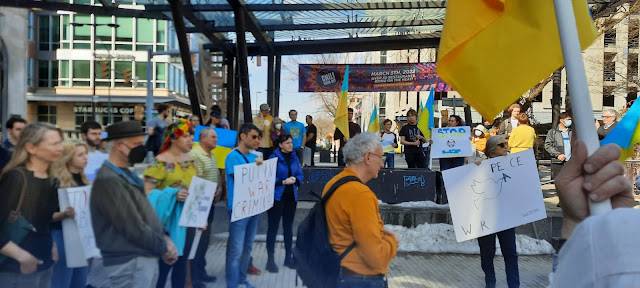WHAT does it feel like when a war begins? When does life as you know it implode? How do you know when it is time to pack up your home and your family and leave your country? Or if you decide not to, why?
-- Janine di Giovanni, 2012
I've been spending a lot of time reading about the war in Ukraine, which is beginning to resemble the Syrian war in many sad and destructive ways. The Russians bombed the child and maternity hospital in Mariupol yesterday, as they also destroyed so many hospitals in Syria. I was just looked back at my many blog entries, searching for an article I read then about the shock of war beginning.
In 2012, I was in Israel on sabbatical from January to the beginning of August. Bashar al-Assad was already slaughtering his own people. Janine di Giovanni's article, "Life During Wartime," made chills go down my spine. I was safe in Jerusalem, but Syria was so close.WHAT does it feel like when a war begins? When does life as you know it implode? How do you know when it is time to pack up your home and your family and leave your country? Or if you decide not to, why?
For ordinary people, war starts with a jolt: one day you are busy with dentist appointments or arranging ballet lessons for your daughter, and then the curtain drops. One moment the daily routine grinds on; A.T.M.’s work and cellphones function. Then, suddenly, everything stops.
Barricades go up. Soldiers are recruited and neighbors work to form their own defense. Ministers are assassinated and the country falls into chaos. Fathers disappear. The banks close and money and culture and life as people knew it vanishes. In Damascus, this moment has come.
War starts very suddenly:
I know about the velocity of war. In all of the wars I have covered — including in Bosnia, Iraq, Afghanistan, Sierra Leone, Chechnya, Kosovo — the moments in which everything changes from normal to extremely abnormal share a similar quality. One evening in Abidjan, Ivory Coast, in 2002, for example, I went to bed after dinner at a lavish French restaurant. When I woke up, there was no telephone service and no radio broadcast in the capital; “rebels” occupied the television station and flares shot through the sky. In my garden I could smell both the scent of mango trees and the smell of burning homes. My neighborhood was on fire. The 24-hour gap between peace and wartime gave me enough time to gather my passport, computer and favorite photos and flee to a hotel in the center of the city. I never returned to my beloved house with the mango trees.
The malign Russian role in the Syrian war had already begun - not with Russian soldier and aircraft, but with the UN:
As Russia continues to veto Security Council efforts to sanction and reproach President Bashar al-Assad, friends in Syria e-mail and tweet about assassinations, brutal killings, doctors torturing victims.
Russia now also stymies any Security Council actions with its vetoes.
We have been here before in Europe.
Thirteen years ago [now 23 years ago], [UN Secretary General] Mr. Annan issued a report to the General Assembly on the failure of the international community to prevent the massacre of Bosnians at Srebrenica. He called it “a horror without parallel in the history of Europe since the Second World War.”
We now have another unparalleled horror in European history. I've been struck by how many commentators write about the Russian war on Ukraine as if it's the only violent European episode since 1945. In the meantime, Russia has waged war in many other countries (just as the US has), and is now using the same tactics in Ukraine as it did in Syria and Chechnya.
Last weekend, there were two rallies in Ithaca in support of Ukraine. One, at noon on Sunday, March 6, was organized by Codepink in coalition with other dubious organizations, like Stop the War UK and the No to NATO Network. I don't know what the signs were in Ithaca, but looking at photos of other rallies sponsored by this coalition, it's clear that they blamed NATO just as much as Russia for the war. The slogan on one Codepink poster: "Stop the war in Ukraine, No to NATO expansion." Another sign - "NATO is the problem."
The second rally, at 2:00 pm, was organized by Ukrainians in Ithaca. I went to the second one, since I actually wanted to support Ukraine.


